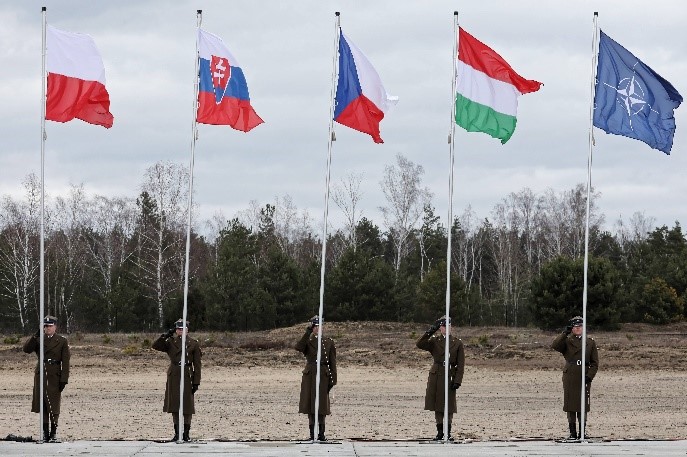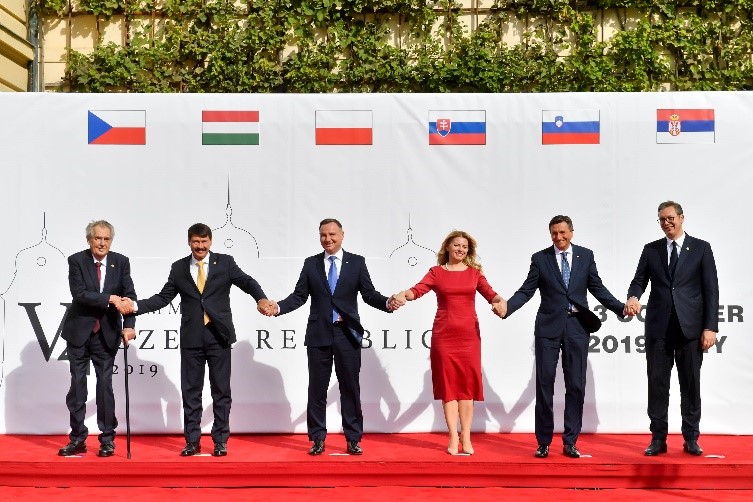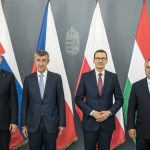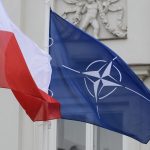THE WARSAW INSTITUTE REVIEW
Date: 4 November 2019 Author: Csaba Farago
The Position of the V4 in Terms of Security Challenges Threatening the European Union
Following the migration crisis period, the Visegrad countries have formed a close union to protect their interests. However, the work within the V4 had become more intensive even before the 2015 events. Today, through cooperation within the organisation, over 100 meetings and consultations are held each year by involving experts and decision makers of the four states, ranging from security policy to energy to economic affairs. In this article we focus on two issues: firstly, the position of the V4 on key issues affecting the European Union and, secondly, the measures taken by the V4 countries in this regard, with particular focus on only the most significant security challenges.
 Celebration of the 20th anniversary of accession to NATO. Poland, the Czech Republic, and Hungary joined NATO on March 12, 1999. Slovakia joined the Alliance in 2004. Warsaw, March 10, 2019. © Paweł Supernak (PAP)
Celebration of the 20th anniversary of accession to NATO. Poland, the Czech Republic, and Hungary joined NATO on March 12, 1999. Slovakia joined the Alliance in 2004. Warsaw, March 10, 2019. © Paweł Supernak (PAP)Actions taken by the Visegrad countries in the most important areas
Military security
Following accession into the EU in 2004, the issue of military cooperation within the V4 had largely been a Cinderella issue mainly in terms of plans, though after 2010 there has been a noticeable shift. This is due to the fact that the global security environment has also changed: on the one hand, the United Kingdom’s departure from the European Union has opened the way to deepening military cooperation, and with the election of Donald Trump the United States increasingly calls for a more proportionate burden-sharing within NATO. Finally, Russian aggression against Ukraine has shed new light on the possibility of a conventional armed clash in Europe. The launch of Pesco demonstrates the EU’s determination.
The V4’s deepening of military cooperation is also motivated by fears that Washington could further reduce its presence in Europe, as Washington increasingly focuses on the Pacific. It also raises concerns that Donald Trump, elected in 2016, has made NATO-sceptical statements. Relations with NATO and the United States are of critical importance for the V4, as these two entities are still the most prominent guarantors of their security in the international arena. It should be emphasised that military cooperation within the framework of the V4 is not aimed at replacing cooperation within NATO, but rather at fulfilling alliance obligations more effectively through cooperation.
One of the most spectacular achievements of the Visegrad countries in the area is the formation of the Visegrad Battlegroup, proving the V4’s ability to contribute significantly to the security objectives of the European Union and NATO, whilst demonstrating their commitment to the United States. The military unit, being in service for half a year since 1 January 2016, consists of 950 Polish, 750 Czech, 400- Hungarian and 400 Slovakian soldiers. Some experts have voiced opinions suggesting that this is not even the most significant achievement of the Visegrad countries; it would be the document of the “Long Term Vision of the Visegrad Countries on Deepening their Defence Cooperation and the Framework for Enhanced Visegrad Defence Planning Cooperation” issued in March 2014, and related to the establishment of the Visegrad Battlegroup, which has set goals and ambitions for defence cooperation for the first time since the existence of the V4.
Coordination of the defence planning, the exchange of the necessary information and the deepening of joint training commenced since 2010. Under the auspices of the cooperation, a larger joint military exercise is conducted each year, as well as smaller ones, if circumstances permit. To illustrate NATO’s appreciation, the Counter Intelligence Centre of Excellence was opened in Krakow. During its implementation phase, not only the strengths of the V4 were revealed, however, but its weaknesses were also exposed when disputes arose between the parties, for example, regarding the appointment of the staff of the institution. The centre of excellence will play an increasingly crucial role in curbing the effectiveness of Russia’s preferred disinformation operations in the future. Recently it has become common for V4 soldiers to cooperate closely in international missions for reasons related to both cost saving and organisational development: for example, close cooperation was exhibited in Kosovo by Czechs and Slovaks; in Cyprus by Hungarians and Slovaks; and in Iraq by Poles and Slovaks.
At the same time, it should be emphasised that military cooperation is still far from optimal, it is therefore advisable for the Visegrad countries to further deepen their cooperation in the coming years. Several cases can be cited to illustrate this: for example, in 2013, a decision was made to set up the Visegrad Group Military Education Platform, but little progress in the realization thereof was made in the following years. In addition, after 2010, the Visegrad states decided to acquire mobile 3D radars and jointly upgrade their helicopter fleet, however, these had partly failed.
Achieving the 2 percent GDP ratio commitment to NATO is still uncertain: in the case of Poland, defence expenditure is just about barely meeting this target, but it is under constant pressure. Hungary has recently increased its expenditure. The Hungarian government has announced the “Zrínyi 2026” Defence and Military Development Program, in the framework of which, Hungary is set to acquire modern equipment, and with this, Budapest has pledged to continue growing its defence budget in the coming years. Thus, military cooperation within the framework of the Visegrad Cooperation is unabatedly a promising policy that can be capitalised on to achieve more with less financial investment.
Russia and Ukraine
Following the Georgian clash and the Russian-Estonian cyber war, relations between the EU and Moscow began to normalise temporarily, but due to the interventions in Ukraine and Syria, and the broken relationship between the United States and Russia, the relations between the European and Russian political elite has deteriorated. Moreover, the V4 are divided on this issue: albeit it is true that during the crisis in Ukraine the states of the bloc concurred with the central resolution of the EU and NATO and called upon Moscow to respect the territorial integrity of Ukraine, beyond that, however, fractures can be identified. For example, Poland has taken a confrontational stance against Russia, advocating the introduction of economic sanctions. The Czech Republic has taken a similar stance on the issue, though a slightly more lenient one than Poland. Slovakia and Hungary, by contrast, do not regard Moscow as a hostile power with which no positive relationship could be maintained, especially if it is economically justified. Hungary has attempted to appear neutral on the issue, which is also necessitated by intensified energy cooperation with Russia regarding the expansion of the Paks Nuclear Power Plant.
Support Us
If content prepared by Warsaw Institute team is useful for you, please support our actions. Donations from private persons are necessary for the continuation of our mission.
As a result of the existing disagreement between the said parties, relations with Moscow do not really appear at the V4 official level. However, it is precisely the ‘omission’ of Russia that impedes the Visegrad Cooperation from gaining more international influence. Strengthening Ukraine from the Visegrad countries’ point of view is essential, given that the country functions as a kind of ‘shield’ for the bloc against Russia, which poses a threat to the region through its unpredictable foreign policy. Following the Ukrainian revolution, the Visegrad countries immediately conveyed their substantial support: in 2014, the V4 ministers of foreign affairs jointly visited Kyiv, promising to help Ukraine implement the reforms after the change in government. The importance of the country to them is depicted by the fact that it is one of those that has benefitted the most from the Visegrad Development Fund in the last decade. During the Slovakian Presidency of the V4, relations between the bloc and Ukraine began to improve again. During the Hungarian Presidency of the V4, the deterioration in the relationship with the Ukrainian leadership was due to the situation that in 2017, Ukrainian legislature adopted an Education Law that restricts the use of minority languages in the education system, and more specifically in secondary and higher education. In addition to the violation of rights and the diminution of minority rights, it is feared that this measure of Kyiv will make the country more unstable. There was an obvious lack of consensus within the V4 on this issue, and the parties stressed the need to find a compromise, but on the whole the Visegrad countries did not manage to uniformly act within the EU regarding the Education Law.
Energy security
For the EU, the prioritisation of energy security issues was elevated when relations with its main source of import, Russia, deteriorated as a result of the events in Ukraine. It should be emphasised that energy policy was already at the forefront of the attention of the V4 before 2010, which is not surprising considering that the countries of the bloc are highly vulnerable to import changes. The importance of this issue is well illustrated by the 2018-2019 Slovak Presidency of the V4 identifying this as a strategic area. Under such auspices, three major initiatives can be recognised: supporting projects that strengthen energy independence, closer cooperation on renewable energy sources, and developing the North-South energy corridor. The Visegrad countries have shown signs they believe that nuclear power plays a key role in improving energy independence. In this regard, the Visegrad Initiative for Nuclear Cooperation should be highlighted, for example, in the framework of which the states are deepening the nuclear energy cooperation and conduct researches on helium-cooled reactors. The Czech Republic provides the necessary helium technology, Slovakia the design and safety control know-how, Hungary the knowledge of nuclear fuel, and Poland its experience of material science.
In the field of energy, the V4 coordinate formally and informally. A major step forward was the setup of the Permanent Forum of Energy Regulators in 2016, in the framework of which, two meetings were held in 2017 with representatives of the bloc’s regulatory bodies. Several conferences on energy security have been and continue to be held by Visegrad countries, and an energy think tank has been launched recently with the financial support of the Visegrad Fund. In order to develop the North-South Corridor, the gas transport infrastructure of Slovakia and Hungary has been connected, and the work between Poland and Slovakia also commenced last year. There is also an undergoing plan for the connection of the Polish-Czech gas pipeline.
Furthermore, the Visegrad countries are increasingly paying attention to liquified natural gas (LNG) as an alternative to traditional sources, which is increasingly valued globally. It should be recalled that over the last decade there has been a slow but steady rearrangement in the global energy market due to technological advances. The United States has moved from an energy importer to an exporter in Europe as a result of shale oil and shale gas extraction. V4 countries have been lobbying the EU to support the expansion of the Central European liquid gas infrastructure, both financially and politically. As an example, it ought to be emphasised that by connecting the Polish-Slovakian gas pipeline network, Slovakia will have access to the Świnoujście liquified natural gas (LNG) terminal, which will allow Bratislava a more intensive energy diversification.
Illegal immigration
Illegal immigration is considered to be one of the major security challenges for the European Union in the long term. In this regard, the V4 have been strongly supporting border protection and local assistance in problematic areas, as opposed to admitting immigrants en masse. More than a few analysts expressed their opinion that the bloc’s role has been valued in the EU mainly due to the migration crisis. The V4 countries vehemently rejected the possible introduction of a migration quota, which has led Western European states to accuse these countries of lacking European solidarity. In contrast, the V4 stance is that it is the sovereign right of each state to determine what solidarity means and to define the criteria for determining who is admitted to their territory. This is well reflected in the resolution of the Slovak political elite: they were willing to accommodate migrants and refugees, but only if the Slovak state can set the different criteria for judging their admission. The states of the bloc would rather support a more flexible solidarity, with a system less engraved than the migration quota, to help the EU countries suffering from massive influxes. On the whole, however, the action of the V4 during the migration crisis showed that the bloc can seriously influence policy development across the EU if it can uniformly act in enforcing its interests. For the Visegrad countries, rejecting the quota or admitting immigrants en masse is also due to their lack of experience in integrating different cultures, and over the centuries, multiculturalism has appeared in a negative rather than a positive light in the region.
NEWSLETTER
Hence, the eyes of the EU have become steadily and gradually drawn paying attention to Africa. Especially in regard to illegal immigration. For similar reasons, following the events of 2015, the V4 countries pledged to cooperate closer to a modest degree on the continent’s development policy. Several actors in the countries of the bloc have declared the need to bring aid in rather than admitting immigrants en masse. This, however, makes it essential to increase the capabilities which really enable them to operate in Africa effectively. There are also other signs that the Visegrad countries are serious about extending their influence in Africa. Poland, the Czech Republic and Hungary have increased the number of their delegations in sub-Saharan Africa from 2010 to the present, as well as increased the number of their soldiers and police from the countries of the bloc have recently served in missions in Mali and the Central African Republic.
 Presidents, left to right: Milos Zeman of Czech Republic, Janos Ader of Hungary, Andrzej Duda of Poland, Zuzana Caputova of Slovakia, Borut Pahor of Slovenia, and Aleksandar Vucic of Serbia, join hands at a photo session prior to the opening of the plenary session of Visegrad Group countries, Lany chateau, Czech Republic, October 3, 2019. © Vit Simanek (PAP/CTK)
Presidents, left to right: Milos Zeman of Czech Republic, Janos Ader of Hungary, Andrzej Duda of Poland, Zuzana Caputova of Slovakia, Borut Pahor of Slovenia, and Aleksandar Vucic of Serbia, join hands at a photo session prior to the opening of the plenary session of Visegrad Group countries, Lany chateau, Czech Republic, October 3, 2019. © Vit Simanek (PAP/CTK)The Western Balkans
Providing political stability in the Balkans is crucial for the V4, as the bloc’s states are almost immediately affected by any negative event. This finding was accentuated by the migration crisis. For the Visegrad countries, promoting the accession of the Western Balkans to the EU is a strategic objective. Several exchanges of experience, educational and cultural initiatives have been affirmed by the V4. The former mainly concerns how the countries of the Western Balkans are to prepare for joining the European Union and how they can further develop the operation of their democratic institutions. Additionally, the Visegrad countries built a well-functioning regional cooperation after the regime change, which would be particularly useful to “export” to the Western Balkans, where tensions and distrust still dominate relations between the states. Benefits of the “model imitation” are shown, for example, by the setup of the West Balkan Fund (WBF) in 2015, which was modelled on the International Visegrad Fund. The idea itself also emerged from the V4 region: in 2010, the implementation of the WBF was raised by two NGOs, and then the idea was officially promoted by the Visegrad countries during the Czech Presidency of the V4. The states in the bloc voted in favour of a grant of EUR 80,000 to help the operation of the WBF. It should be noted that the Fund is currently struggling with underfunding. With the support of the Visegrad Development Fund, programs aimed at improving relations between local countries have also been affirmed. The project of the “Western Balkans Expert Network” can be considered a rather significant initiative, which provided further training for judicial staff in the Western Balkans in 2014.
During the migration crisis, the V4 actively assisted the Balkan states in strengthening their border protection, for example, by sending police officers there. However, this action undertaking has been mainly carried out through bilateral agreements, avoiding the formal organisational structure. One can observe analysts approaching the matter being divided, where considerable arguments do not see this as a disadvantage; some believe that it provides the bloc a high degree of flexibility. The argument follows up on this with that the international environment is ideal for the V4 to extend their influence in the region, since as a result of the events in recent years, Western Europe has lost some of its credibility and attractiveness. As a result of the increasingly intensive disputes and other circumstances within the EU, resistance to the expansion of the bloc remains strong. In these, it is important to recognise that the V4 cannot compete in the region with China namely, which has extraordinary financial means to gain influence.
Albeit considerable economic interests in the Western Balkans for the Visegrad countries are limited in scope for the time being, the importance of the region is steadily and surely increasing in this regard. Coordination of the development of the transport and energy infrastructure of the Western Balkan countries and the strengthening of local discourse on this topic were focused on during the Hungarian Presidency of the V4. This remained a priority during the Slovak Presidency. By working in the region, the Visegrad countries demonstrate to Western Europe that even if they criticise several policies, they are committed to the EU. Through their support to the Western Balkans, the V4 is also strengthening its position within the EU by proving that they are ready to use their own accession experience in order to prepare these countries. Finally, the influence of the V4 in the region is being even further raised by the invitation of Poland to the Berlin process. Poland’s Presidency of the Berlin Process was culminated in the Western Balkans Summit was hosted in July in Poznan this year, making remarkable contributions as the Ministry of Foreign Affairs was accompanied also by the Ministry of Entrepreneurship and Technology to underscore the integration facilitation across various levels and platforms, as was enabled by Poland’s and the V4 countries’ experience.
All texts published by the Warsaw Institute Foundation may be disseminated on the condition that their origin is credited. Images may not be used without permission.














